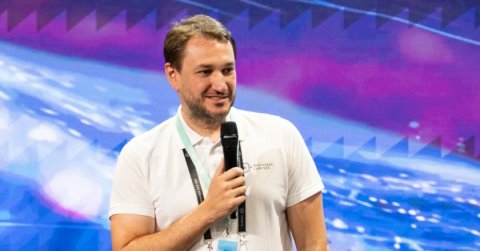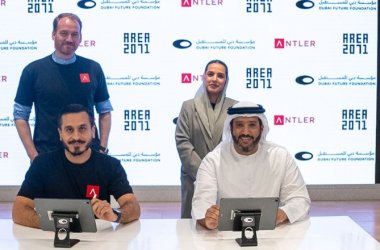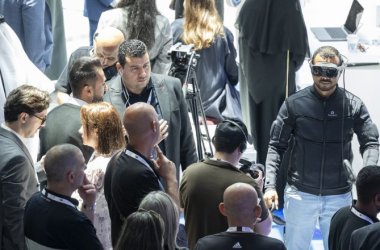
Dubai — The final day of the “Machines Can See 2025” summit concluded with 3,500 delegates from 45 countries attending the summit at the Museum of the Future, while online engagement reached new heights, with over 3.5 million views on day one and more than 1.2 million views on day two. Real-time updates via the #MCS2025 hashtag are projected to exceed 5 million views across both days.
The summit took place during the inaugural Dubai AI Week event organized by the Dubai Centre for Artificial Intelligence, an initiative overseen by the Dubai Future Foundation.
Mixed‑reality opener sets the pace
The day began with an immersive keynote from Marco Tempest, Creative Technologist at NASA JPL, who fused holography and large language models to illustrate how “playful” interfaces make advanced AI relatable to non‑experts. “Magic is just undiscovered code,” Tempest told the packed auditorium, spotlighting the summit’s core theme of translating research into human‑centred experiences.
Robotics and spatial computing take centre stage
A follow‑on panel — “Robots: Are We Ready?” — gave attendees a front‑row view of real‑world autonomy. Prof. Sami Haddadin (MBZUAI) demonstrated dexterous cobots for precision assembly, whereas entrepreneur Lior Wolf previewed humanoid service assistants designed for retail environments.
Prof. Marc Pollefeys (ETH Zurich & Microsoft) unveiled state‑of‑the‑art Spatial AI algorithms capable of building millisecond‑level 3‑D maps — critical for household robotics and next‑generation AR glasses.
Government underscores ethical mandate
In morning remarks, H.H. Sheikh Nahyan bin Mubarak Al Nahyan, UAE Minister of Tolerance and Coexistence, reiterated that “AI without human values is a compass with no direction.” His call for ethics‑first development reverberated through afternoon sessions on trustworthy AI and adversarial‑attack defence.
Research highlights push the frontier
Prof. Michal Irani (Weizmann Institute) showed how models can reconstruct complex scenes from a single gaze sequence, edging AI closer to human‑like perception.
Prof. Andrea Vedaldi (University of Oxford) introduced a 3‑D generative‑AI pipeline for high‑fidelity digital twins, while Prof. Deva Ramanan (Carnegie Mellon) demonstrated multimodal sensor fusion for real‑time decision‑making in dynamic environments.
Namik Hrle (IBM) wrapped up the main‑stage keynotes with a forward look at vector databases, sovereign model “gardens,” and edge‑trained chips that could shrink latency to microseconds.
Workshops deepen technical skill sets
Parallel tracks remained full throughout the day. NVIDIA’s hands‑on lab dissected a platform approach to deploying generative AI in production.
AWS guided developers through Retrieval‑Augmented Generation (RAG) and agentic‑AI patterns for the enterprise.A second X (formerly Twitter) session explored Grok‑powered predictive streaming, while Dubai Police’s data‑forensics workshop demonstrated machine‑vision pipelines for DNA decoding.
Climate tech, computer vision and security panels round out agenda
Expert round‑tables tackled Beyond Climate Change innovations in green technology and dove into the year’s breakthroughs in computer vision, while Rob van der Veer led a live “red team vs. blue team” demonstration during the Defending Intelligence panel on adversarial machine learning.
Landmark Agreements Announced Live on Stage
Polynome Group officially launched AI Academy, a strategic educational initiative developed in collaboration with the Abu Dhabi School of Management and supported by NVIDIA’s Deep Learning Institute. The Academy will offer short executive seminars and a specialized four‑month Mini‑MBA in Artificial Intelligence, aimed at equipping leaders and innovators with practical AI knowledge to bridge the gap between technology research and commercial application.
Creative‑tech track draws art and media innovators
Running in parallel at the “Machines Can Create” stage, sessions such as “Pixels & Palettes: The Canvas of Tomorrow” and “Code Couture” examined how AI, blockchain and VR are reshaping luxury fashion and digital art, featuring speakers from IBM Research, The Sandbox and HEC Paris.
Closing reflections and next steps
In final remarks, Hao Li (MBZUAI) and Prof. Merouane Debbah thanked delegates for “turning Dubai into a living laboratory for responsible AI,” while Tempest sent attendees off with a challenge: “The future belongs to curious minds and bold builders — keep experimenting.” Polynome Group confirmed that planning is already underway for the 2026 edition and for regional satellite workshops that will extend the summit’s science‑to‑solution model to new markets.





